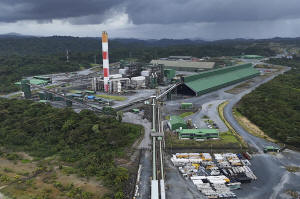Panama reopens talks about the future of a controversial copper mine,
but opposition remains
[March 22, 2025] By
MATÍAS DELACROIX and ALMA SOLÍS
DONOSO, Panama (AP) — More than a year after Panama’s Supreme Court
halted operations at a huge copper mine because its government
concession was deemed unconstitutional, the country's new administration
is signaling a potential restart.
Business groups are lobbying President José Raúl Mulino, who says he’ll
start discussing the mine’s future with his team next week. The mine’s
owner is conducting media tours and has said it will suspend
arbitration, while the coalition of environmental and civic groups that
snarled traffic for weeks in 2023 calling for the mine’s closure is
preparing to hit the streets again.
Mulino has already ordered that the mine’s power plant be restarted and
that some $250 million worth of copper concentrate sitting at the mine
be sold. And on Thursday, he appeared to signal where he was leaning.
Noting the mine’s economic impact — it accounted for nearly 5% of Panama
gross domestic product the last year it operated — Mulino said: “On what
basis can I say, as president of the republic, ’good-bye, to the mine,
there won’t be a mine because five people who don’t pay a payroll don’t
want a mine?'”
The concession
In March 2023, Panama’s Congress reached an agreement with Canadian
mining company First Quantum, allowing its local subsidiary Panama
Copper to continue operating the mine for at least 20 more years. The
open-pit mine was temporarily closed in 2022 when talks between the
government and First Quantum broke down over payments the government
wanted.
The contract, given final approval Oct. 20, 2023, allowed the subsidiary
to continue operating the mine in a biodiverse jungle on the Atlantic
coast west of the capital for the next 20 years, with the possibility of
extending for a further 20 years if the site remained productive.
The deal faced opposition from those who believed Panama wasn’t getting
as much as it should and from environmentalists and Indigenous groups
who raised concerns about the mine’s impact.

The dispute led to some of Panama’s most widespread protests in recent
years, including a blockade of the mine’s power plant. Protesters also
blocked parts of the Pan American highway, including a stretch near the
border with Costa Rica.
On Nov. 28, 2023, Panama’s Supreme Court ruled unanimously that the
20-year concession was unconstitutional and then-President Laurentino
Cortizo announced the start of a process to close the mine.
Days before the court’s ruling, the Congress had also passed a
moratorium on metal mining in Panama.
The mine
The road to Cobre Panamá now is peppered with signs calling for its
reopening. At its peak, it had employed more than 7,000 people, of which
only about 1,000 remain as the company tries to keep the surrounding
jungle at bay and the equipment from rusting away.
[to top of second column] |

The thermoelectric plant of the Cobre Panama copper mine, owned by
Canada's First Quantum Minerals, in Donoso, Panama, Friday, March
21, 2025, during a media tour of the mine that was closed after
Panama's Supreme Court ruled that the government concession was
unconstitutional. (AP Photo/Matias Delacroix)
 Edgardo Díaz, who sold food to mine
workers, said many vendors had to shutter their businesses when the
mine stopped operating. He said he was one of five vendors who met
with Mulino several weeks ago. “We asked that the mine be reopened.”
But not everyone agrees. Abelisario Rodríguez, a resident of Río
Caimito near the mine, said that despite the mine’s presence and the
money it generated, his community still lacked basic services like
electricity, drinking water, a health center and school.
He said there had been a lot of promises made about the development
the mine would bring, but he didn’t see it reflected in his
community and he didn’t want to see it reopened.
“We don’t want mines in Panama because we’ve seen the experiences of
countries like Chile, Peru, mining countries, communities that have
been razed, that have been contaminated with sick populations,”
Rodríguez said. “We don’t want that for our future generations.”
Manuel Aizpurua, head of Cobre Panamá, said they’ve started bringing
people to the mine to show the condition of the equipment and the
need to make a decision on the mine’s future.
“Nature is attacking these installations and this equipment, taking
them to a degree of deterioration where it won’t be possible to
restart the mine if we don’t do something urgently,” Aizpurua said.
“We understand that an operation like this must generate significant
benefits for the country and the surrounding communities, not only
for our shareholders and investors,” he said. “We’re prepared to sit
down with the national government as soon as possible without
preconditions to find a solution to achieve that objective.”
Opposition remains
Shortly after Mulino made his comments about the mine Thursday, the
40-organization coalition Panama is Worth More without Mining
gathered in the capital.
Lilian González Guevara, executive director of the nongovernmental
Environmental Incident Center, pushed back against the economic
argument for reopening the mine. She said that while many countries
had struggled economically recently, Panama had grown even without
the mine operating last year.
“We haven’t depended on mining, it’s a fallacy,” she said. The only
dialogue the group was open to having was about permanently closing
the mine.
The coalition has called for a public vigil Sunday to remind
authorities of the public’s opposition to the mine.
All contents © copyright 2025 Associated Press. All rights reserved |